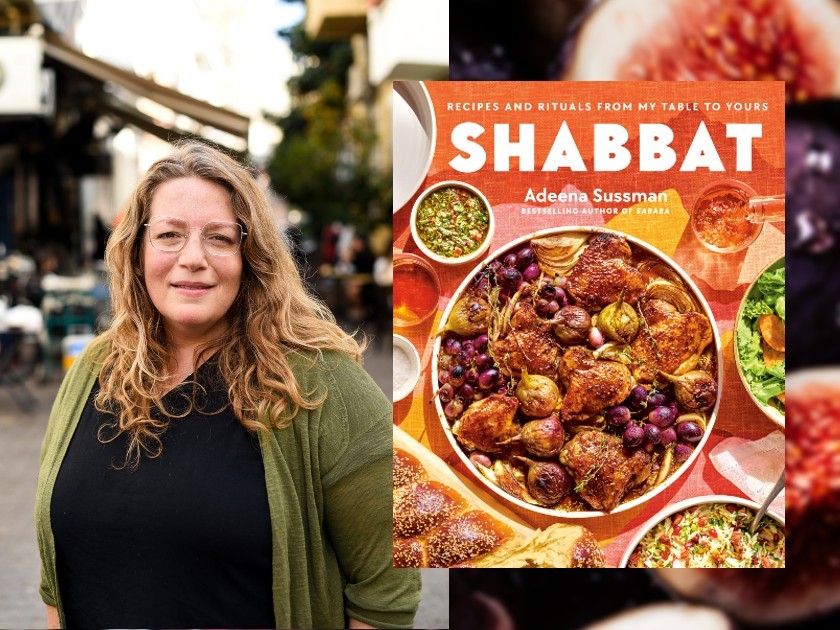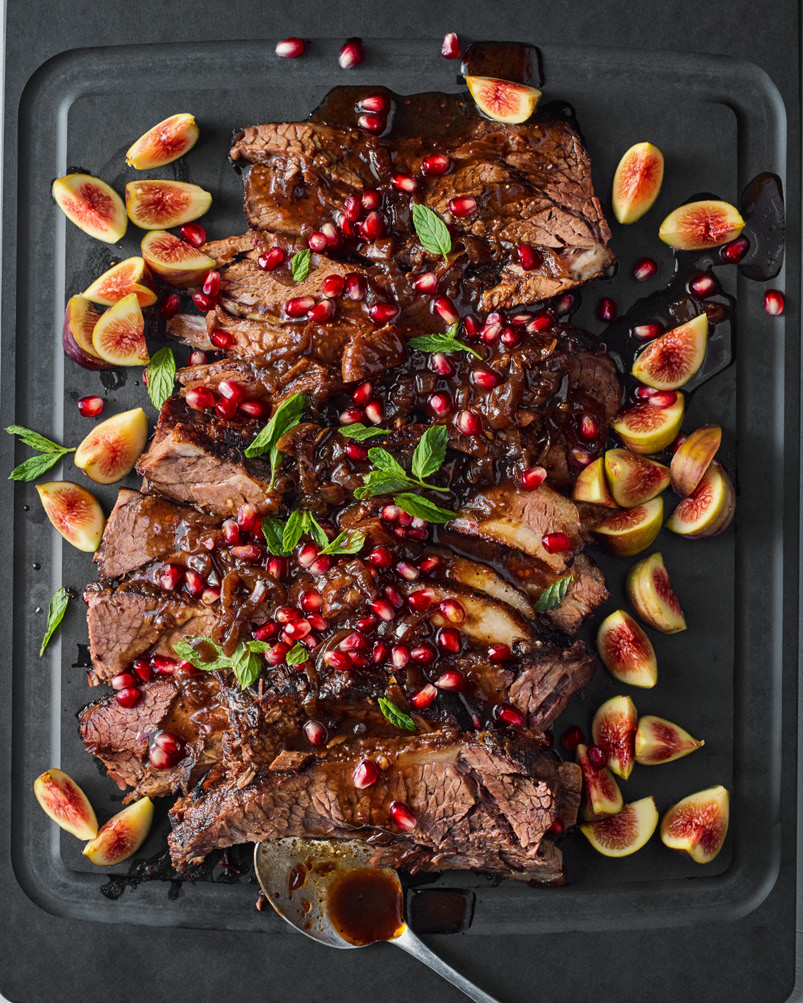
Author photo by Lisa Rich
Background photo of figs by Tetiana Padurets on Unsplash
Fig and Pomegranate Brisket
Serves 8 to 10
Active Time: 1 hour
Total Time (Including chilling time): 13 hours
Considered one of the crown jewels of Shabbat and holiday cooking, brisket has decidedly humble beginnings. Inexpensive due to its toughness and originally considered a throwaway cut, brisket became a staple of cold-weather Easter European Jewish cooking when farmers realized it was less expensive to butcher a cow than to feed it all winter long. Home cooks became experts at slow-cooking brisket to tender perfection, adding onions and often a tomato-based liquid to coax out the meat’s flavor and ideal texture. Aside from my mother’s recipe (see page 283), this is the version I find myself making the most. Tons of garlic and onions, white wine, and two types each of figs (fresh and dried) and pomegranate (molasses and fresh seeds) come together for a finished brisket that is simultaneously homey and elegant. Brisket is always better served the next day; if you have time, cool the whole cut in its braising liquid, then slice it against the grain and re-warm gently in the sauce.
One 5‑pound brisket with a good amount of fat
1 tablespoon plus 1 teaspoon kosher salt, plus more for seasoning
1 1/2 teaspoons freshly ground black pepper, plus more for seasoning
1/4 cup vegetable oil 3 large onions, thinly sliced (6 cups)
2 tablespoons all‑purpose or gluten-free flour
10 garlic cloves, peeled and left whole
2 tablespoons tomato paste
2 cups dry white wine
1 1/2 cups beef or chicken broth
1/3 cup pomegranate molasses
4 dried figs, chopped
1/4 cup honey
1 1/2 teaspoons red wine vinegar
1 tablespoon ground cumin
1 teaspoon dried red pepper flakes
6 fresh figs,* quartered
1/2 cup pomegranate seeds
Mint leaves, for garnish
- Preheat the oven to 300°F
- Arrange the brisket on a large plate and season it generously on all sides with 1 tablespoon of the salt and 1 teaspoon of the pepper. In a large, heavy Dutch oven, heat the oil over medium-high heat until very hot but not smoking. Add the brisket (fattier side down, if there is one) and sear until deeply browned and crisped in parts, 6 to 7 minutes. Carefully flip the brisket and sear for another 6 minutes, then, if they’re thick enough, sear each of the narrow sides, standing up the brisket, if possible, 3 minutes per side. Remove to a plate, leaving any fat and juices in the pan.
- Add the onions and flour and cook, stirring occasionally, until the flour is absorbed, 1 minutes, then add the garlic and tomato paste and cook, stirring occasionally, until the onions begin to soften, 5 minutes. Add the wine, raise the heat to high, bring to a boil, then turn down the heat and simmer until the wine reduces by half, 4 to 5 minutes. Add the broth, pomegranate molasses, dried figs, honey, vinegar, cumin, red pepper flakes, and the remaining 1 teaspoon salt and 1/2 teaspoon black pepper.
- Bring to a boil over high heat, then reduce the heat to a simmer and gently lower the brisket back into the roasting pan, spooning some of the sauce and onions over the brisket. Cover the brisket with a piece of parchment paper (this will prevent the acid in the sauce from interacting with the foil), seal the roasting pan tightly with foil, and cook in the oven until the brisket is tender, 4 hours to 4 hours 30 minutes. Remove the oven, unseal slightly, then let the brisket come to room temperature, about 1 hour.
- If you have time, refrigerate the brisket overnight, then uncover it and remove and discard the congealed fat. Remove the brisket from the sauce and slice it against the grain into 1/4‑inch-thick slices. Heat the sauce in the roasting pan or another pot over medium-high heat, until boiling. Lower the heat and simmer until the sauce thickens to your liking, 10 to 15 minutes. Nestle the sliced brisket back in the sauce, cover with foil, and warm gently in a 200 degree oven until everything is heated through, 45 minutes to 1 hour.
- To serve, transfer the brisket and sauce to a platter, season with salt and pepper, and garnish with fresh figs, pomegranate seeds, and mint leaves.
*If you can’t find fresh figs, garnish with more pomegranate seeds.

Photo courtesy of the publisher
From Shabbat by Adeena Sussman, published by Avery, an imprint of Penguin Publishing Group, a division of Penguin Random House, LLC. Copyright @ 2023 by Adeena Sussman
Adeena Sussman is the New York Times bestselling author of Shabbat and Sababa. She cooks and writes from her kitchen in Tel Aviv, where she lives in the city’s Carmel Market neighborhood with her husband, Jay Shofet.